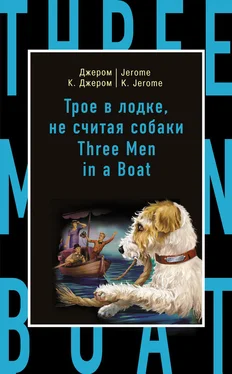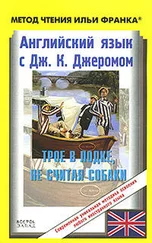I found him in trouble, the next time I awoke, because he could not find his socks; and my last hazy remembrance is of being rolled over on my side, and of hearing Harris muttering something about its being an extraordinary thing where his umbrella could have got to.
Household duties. – Love of work. – The old river hand1, what he does and what he tells you he has done. – Scepticism of the new generation. – Early boating recollections. – Rafting. – George does the thing in style. – The old boatman, his method. – So calm, so full of peace. – The beginner. – Punting. – A sad accident. – Pleasures of friendship. – Sailing, my first experience. – Possible reason why we were not drowned.
We woke late the next morning, and, at Harris’s earnest desire, partook of a plain breakfast, with “non dainties.” Then we cleaned up, and put everything straight (a continual labour, which was beginning to afford me a pretty clear insight into a question that had often posed me – namely, how a woman with the work of only one house on her hands manages to pass away her time), and, at about ten, set out on what we had determined should be a good day’s journey.
We agreed that we would pull this morning, as a change from towing; and Harris thought the best arrangement would be that George and I should scull, and he steer. I did not chime in with this idea at all; I said I thought Harris would have been showing a more proper spirit if he had suggested that he and George should work, and let me rest a bit. It seemed to me that I was doing more than my fair share of the work on this trip, and I was beginning to feel strongly on the subject.
It always does seem to me that I am doing more work than I should do. It is not that I object to the work, mind you; I like work: it fascinates me. I can sit and look at it for hours. I love to keep it by me: the idea of getting rid of it nearly breaks my heart.
You cannot give me too much work; to accumulate work has almost become a passion with me: my study is so full of it now, that there is hardly an inch of room for any more. I shall have to throw out a wing [79]soon.
And I am careful of my work, too. Why, some of the work that I have by me now has been in my possession for years and years, and there isn’t a finger-mark on it. I take a great pride in my work; I take it down now and then and dust it. No man keeps his work in a better state of preservation than I do.
But, though I crave for work, I still like to be fair. I do not ask for more than my proper share.
But I get it without asking for it – at least, so it appears to me – and this worries me.
George says he does not think I need trouble myself on the subject. He thinks it is only my over-scrupulous nature that makes me fear I am having more than my due; and that, as a matter of fact, I don’t have half as much as I ought. But I expect he only says this to comfort me.
In a boat, I have always noticed that it is the fixed idea of each member of the crew that he is doing everything. Harris’s notion was, that it was he alone who had been working, and that both George and I had been imposing upon him. George, on the other hand, ridiculed the idea of Harris’s having done anything more than eat and sleep, and had a cast– iron opinion that it was he – George himself – who had done all the labour worth speaking of.
He said he had never been out with such a couple of lazily skulks as Harris and I.
That amused Harris.
“Fancy old George talking about work!” he laughed; “why, about half-an– hour of it would kill him. Have you ever seen George work?” he added, turning to me.
I agreed with Harris that I never had – most certainly not since we had started on this trip.
“Well, I don’t see how YOU can know much about it, one way or the other,” George retorted on Harris; “for I’m blest if you haven’t been asleep half the time. Have you ever seen Harris fully awake, except at meal-time?” asked George, addressing me.
Truth compelled me to support George. Harris had been very little good in the boat, so far as helping was concerned, from the beginning.
“Well, hang it all, I’ve done more than old J., anyhow,” rejoined Harris.
“Well, you couldn’t very well have done less,” added George.
“I suppose J. thinks he is the passenger,” continued Harris.
And that was their gratitude to me for having brought them and their wretched old boat all the way up from Kingston, and for having superintended and managed everything for them, and taken care of them, and slaved for them. It is the way of the world.
We settled the present difficulty by arranging that Harris and George should scull up past Reading, and that I should tow the boat on from there. Pulling a heavy boat against a strong stream has few attractions for me now. There was a time, long ago, when I used to clamour for the hard work: now I like to give the youngsters a chance.
I notice that most of the old river hands are similarly retiring, whenever there is any stiff pulling to be done. You can always tell the old river hand by the way in which he stretches himself out upon the cushions at the bottom of the boat, and encourages the rowers by telling them anecdotes about the marvellous feats he performed last season.
“Call what you’re doing hard work!” he drawls, between his contented whiffs, addressing the two perspiring novices, who have been grinding away steadily up stream for the last hour and a half; “why, Jim Biffles and Jack and I, last season, pulled up from Marlow to Goring in one afternoon – never stopped once. Do you remember that, Jack?”
Jack, who has made himself a bed up in the prow of all the rugs and coats he can collect, and who has been lying there asleep for the last two hours, partially wakes up on being thus appealed to, and recollects all about the matter, and also remembers that there was an unusually strong stream against them all the way – likewise a stiff wind.
“About thirty-four miles, I suppose, it must have been,” adds the first speaker, reaching down another cushion to put under his head.
” No – no; don’t exaggerate, Tom,” murmurs Jack, reprovingly; “thirty– three at the outside.”
And Jack and Tom, quite exhausted by this conversational effort, drop off to sleep once more. And the two simple-minded youngsters at the sculls feel quite proud of being allowed to row such wonderful oarsmen as Jack and Tom, and strain away harder than ever.
When I was a young man, I used to listen to these tales from my elders, and take them in, and swallow them, and digest every word of them, and then come up for more; but the new generation do not seem to have the simple faith of the old times. We – George, Harris, and myself – took a “raw ’un” [80]up with us once last season, and we plied him with the customary stretchers about the wonderful things we had done all the way up.
We gave him all the regular ones – the time-honoured lies that have done duty up the river with every boating-man for years past – and added seven entirely original ones that we had invented for ourselves, including a really quite likely story, founded, to a certain extent, on an all but true episode, which had actually happened in a modified degree some years ago to friends of ours – a story that a mere child could have believed without injuring itself, much.
And that young man mocked at them all, and wanted us to repeat the feats then and there, and to bet us ten to one that we didn’t.
We got to chatting about our rowing experiences this morning, and to recounting stories of our first efforts in the art of oarsmanship. My own earliest boating recollection is of five of us contributing threepence each and taking out a curiously constructed craft on the Regent’s Park lake, drying ourselves subsequently, in the park-keeper’s lodge.
Читать дальше
Конец ознакомительного отрывка
Купить книгу









